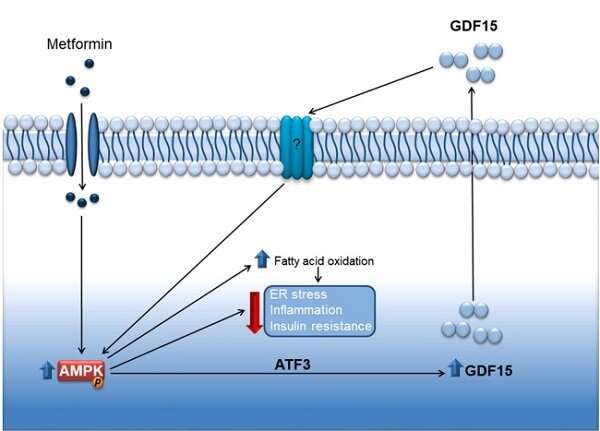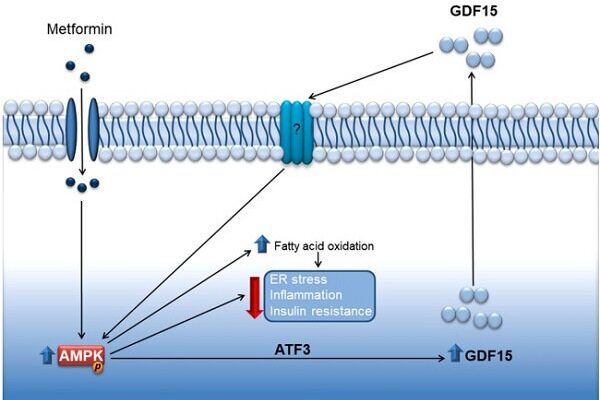
Metformin, the most prescribed drug for treating diabetes mellitus, known as type 2 diabetes, requires the presence of the growth differentiation factor 15 (GDF15)—a protein whose expression increases in response to cellular stress—to present its antidiabetic effects.
This discovery is stated in a study led by the research group of the Diabetes and Associated Metabolic Diseases Networking Biomedical Research Centre (CIBERDEM) of the University of Barcelona (UB) and the Sant Joan de Déu Research Institute (IRSJD), which included the participation of a team of the Alberto Sols Biomedical Research Institute (CSIC/UAM).
The study, published in the journal Pharmacological Research, reveals a new mechanism through which the positive regulation of the GDF15 cytokine involved in the response to cellular stress, activates a metabolic sensor (AMPK) which is key in the energy balance. The study also shows that the action of GDF15 is independent of the activation of its receptors located in the central nervous system—the only ones known to date—which suggests the existence of new actions of this cytokine mediated by the peripheral receptors to be determined.
Type 2 diabetes is a complex metabolic disorder characterized mainly by an excessive amount of glucose in the blood due to the body’s inability to properly respond to the insulin action—a process known as insulin resistance—or to produce this hormone. During the development of this pathology, cellular stress occurs, which causes an increase in the secretion of cytokines in response to this process—such as GDF15—which activate mechanisms to counteract processes such as inflammation or insulin resistance.
Although metformin is the most used drug in the treatment of type 2 diabetes, the mechanisms responsible for the antidiabetic effects are not completely understood. For this reason, this study aims to determine whether the action of metformin depends on the stress-response protein GDF15, according to Professor Manuel Vázquez-Carrera, head of the CIBERDEM group at the Faculty of Pharmacy and Food Sciences and the UB Institute of Biomedicine (IBUB), and coordinator of the study.
“The GDF15 is a cellular stress response cytokine—with increased levels in many diseases, such as heart failure, cancer, fatty liver and diabetes—which has been presented as a potential biomarker of many diseases, and in this specific study, we have studied its participation in the activation of AMPK by metformin,” notes the researcher.
Ángela M. Valverde, head of the CIBERDEM group at the Alberto Sols Biomedical Research Institute (CSIC/UAM), and co-author of the study, says that “our findings suggest that the activation of AMPK by metformin increases the GDF15 levels and, at the same time, this cytokine contributes to maintaining the AMPK activity.”
A study in wild mice with and without the cytokine GDF15
To reach these conclusions, the researchers used wild mice expressing GDF15 and other mice without this cytokine. After causing obesity and type 2 diabetes in these mice by feeding them a high-fat diet, they observed that the antidiabetic effect caused by metformin in wild mice disappeared in those mice without GDF15.
Also, the activation of AMPK caused by metformin in the liver and the muscles of wild mice, was also absent in those mice that did not express GDF15.
To rule out the involvement of the GDF15 central receptors in changes caused by the GDF15, the researchers used cell cultures of hepatocytes and muscle cells in those on which the reduction of GDF15 attenuated the increase in AMPK activity caused by metformin, which suggested that the effects of metformin on AMPK were independent of the central nervous system.
David Aguilar-Recarte et al, A positive feedback loop between AMPK and GDF15 promotes metformin antidiabetic effects, Pharmacological Research (2022). DOI: 10.1016/j.phrs.2022.106578
Citation:
Metformin relies on the action of a cellular-stress-response protein, study finds (2022, December 16)
retrieved 18 December 2022
from https://medicalxpress.com/news/2022-12-metformin-action-cellular-stress-response-protein.html
This document is subject to copyright. Apart from any fair dealing for the purpose of private study or research, no
part may be reproduced without the written permission. The content is provided for information purposes only.
Source link




